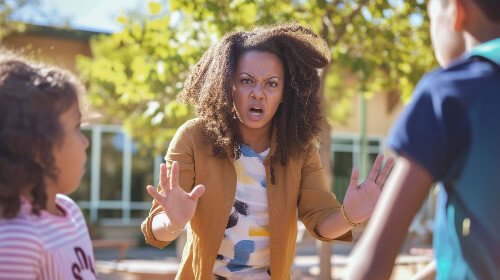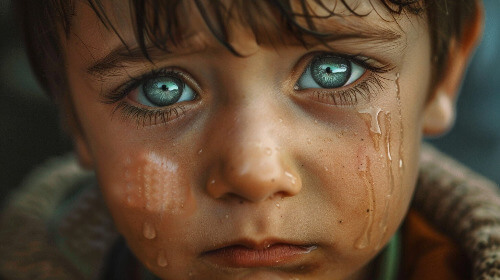The Hidden Wounds: Understanding Emotional Abuse in Childhood and Its Lifelong Effects
As parents, caregivers, or anyone who interacts with children, it’s our responsibility to nurture, protect, and empower the young hearts in our care. Yet, there’s one form of harm that often goes unnoticed—emotional abuse.
Unlike physical harm, the scars of childhood emotional abuse aren’t visible, but they leave deep and lasting effects.
What is Emotional Abuse?
- Constant criticism or belittling
- Ignoring or dismissing a child’s feelings
- Extreme demands or unrealistic expectations
- Frequent shaming or humiliation
- Manipulation or controlling behavior
- Exposing a child to domestic violence or adult conflicts
Unlike other forms of abuse, emotional abuse is often subtle, making it harder to recognize. Yet, its effects are profound, affecting every aspect of a child’s development.
 Mom appears to be upset with and is gesturing at her two children while outside in public.
Mom appears to be upset with and is gesturing at her two children while outside in public.The Effects of Emotional Abuse in Children
Children who experience emotional abuse in childhood often struggle with:
1. Low Self-Esteem
When a child hears they’re “not good enough” or feels like a burden, they may internalize these messages. Over time, they start doubting their worth.
2. Difficulty Regulating Emotions
Children who endure frequent criticism or neglect may struggle to process or express emotions. Leading to anxiety or emotional numbness.
3. Trust Issues
Emotional abuse erodes a child’s trust in others, especially caregivers. They might hesitate to form close bonds, fearing rejection or betrayal.
4. Academic and Social Challenges
The stress of emotional abuse can make it hard for kids to focus at school or make friends, leaving them to feel isolated.
The Long-Term Impact on Adulthood
The effects of childhood emotional abuse don’t fade with time. Their emotional scars will likely go with them into their relationships, careers, and daily lives.
1. Struggles with Self-Worth
Adults who endured emotional abuse often grapple with feelings of inadequacy. They may second-guess their abilities or downplay their achievements.
2. Unhealthy Relationships
Many survivors of childhood emotional abuse find themselves in toxic relationships, either mimicking the dynamics they grew up with or tolerating mistreatment because it feels familiar.
3. Anxiety and Depression
Lingering feelings of shame, guilt, or unworthiness can lead to chronic anxiety or depression.
4. Fear of Failure or Perfectionism
Some adults become perfectionists, desperate to avoid the criticism they faced as children. Others might avoid challenges altogether, paralyzed by a fear of failure.
How to Recognize Emotional Abuse
Parents and caregivers need to be vigilant about recognizing the signs of emotional abuse in children.
These include:
- Fear of making mistakes
- Difficulty expressing emotions
- Sudden changes in behavior, like withdrawal or aggression
- A child who frequently apologizes or appears overly eager to please
- Developmental delays or regression, such as bedwetting or thumb-sucking in older children
- Statements like “I’m stupid” or “Nobody cares about me”
 A young child with stunning blue eyes looks very emotional with tears streaming down his face.
A young child with stunning blue eyes looks very emotional with tears streaming down his face.Trust your instincts. If something doesn’t feel right, it’s worth looking into further. Reach out to a school counselor, child protective services, or a trusted professional for guidance.
Building Resilience: Helping Children Overcome Emotional Abuse
While we can't always shield our children from every hurt, we can give them tools to bounce back from adversity.
Here's how we can foster resilience in children who have experienced emotional abuse:
- Provide a stable, loving environment
- Encourage healthy self-expression
- Teach problem-solving skills
- Help them identify and celebrate their strengths
- Connect them with positive role models
Breaking the Cycle
With the right support it is possible to heal.
For Parents:
- Create a Safe Space: Let your child know it’s okay to share their feelings. Listen without judgment.
- Affirm Their Worth: Regularly remind your child of their strengths and value.
- Apologize When Necessary: If you’ve acted in a way that might hurt your child emotionally, acknowledge it and apologize.
For Survivors:
- Seek Therapy: A trained counselor can help unpack past trauma and build healthier coping strategies.
- Build Support Networks: Surround yourself with people who uplift and encourage you.
- Practice Self-Compassion: Challenge negative self-talk and remind yourself that you deserve kindness and care.
- Set Boundaries: Learn to identify and distance yourself from toxic situations or people.
Preventing Emotional Abuse in Families
Awareness is the first step to prevention. Here’s how we can protect children:
- Educate Yourself: Learn about emotional abuse and its signs.
- Listen actively: Really hear what your child is saying and validate their feelings.
- Monitor Stress Levels: Parenting is hard, and stress can lead to unintentional hurtful behaviors. Seek support when needed.
- Practice Empathy: Try to see the world through your child’s eyes.
- Practice Positive Parenting: Focus on encouragement and praise rather than criticism.
- Manage Your Own Emotions: Take a deep breath and step away if you feel overwhelmed.
The Ripple Effect: How Emotional Abuse Impacts Families
Emotional abuse doesn't just affect the child – it can tear entire families apart. Siblings might feel guilty or become overly protective. Parents may find themselves at odds, blaming each other for the situation.
Let’s Work Together
No parent wants to harm their child, but emotional abuse often happens unintentionally or as a result of stress. Recognizing it is the first step to breaking the cycle.
Remember, every child has the potential to thrive, even if they have experienced emotional abuse. With your love and support, they can rewrite their story and create a brighter future.

























New! Comments
Have your say about what you just read! Leave me a comment in the box below.